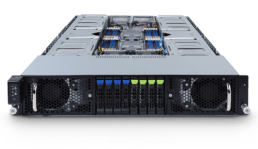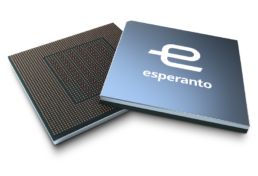Outstanding solutions
for Generative AI and HPC.
Our solutions are built on RISC-V, the open instruction set standard, using an innovative low-power approach which enables us to deliver an exceptional value proposition for AI inference and HPC applications.
Generative AI inference at a fraction of the cost.
The Esperanto AI / HPC Compute Server
Meet the world’s most efficient solution for Generative AI inference, HPC, and mixed mode (AI + HPC) workloads.
Our high-performance systems enable direct access to many thousands of high-performance, low power RISC-V cores, delivering superior compute efficiency to CPU- and GPU-based offerings. Run Generative AI, Transformers, Computer Vision and Recommendation models, as well as massively parallel HPC workloads and mixed AI plus HPC workloads. Available today for purchase or secure remote cloud access.


ET-SoC-1 Chip
The world’s most efficient RISC-V commercial chip.
The ET-SoC-1 inference chip is designed to be the world’s most efficient RISC-V commercial chip, with over a thousand RISC-V processors on a single TSMC 7nm chip delivering a massively parallel, flexible architecture that combines exceptional performance and ultra-low power consumption. ET-SoC-1 delivers low total cost of ownership for AI, HPC and mixed AI plus HPC workloads.
Energy Efficiency
Exceptional energy efficiency for a full range of AI and HPC workloads.
Power consumption continues to be the most critical problem facing high-performance computing today. To address this challenge we employ an array of over a thousand low-power ET-Minion™ cores, delivering energy efficiency with high integer and floating-point throughput, including tensor and vector acceleration optimized for AI and HPC workloads.


RISC-V ISA
RISC-V is the future of computinginnovation.
Esperanto Technologies leverages RISC-V, an open standard ISA enabling a new era of processor innovation. As a founding member of RISC-V International, Esperanto is at the forefront of the RISC-V revolution, using the instruction set architecture to develop the world’s most efficient parallelized AI and HPC accelerators. Our high-performance out-of-order processor cores can boot Linux in self-hosted mode while our energy-efficient multithreaded in-order processor cores form a very powerful compute fabric to accelerate AI and HPC workloads. Our software stacks support standard AI frameworks and leverage the rich RISC-V software ecosystem.
Scalability & Flexibility
Exceptional energy efficiency for a full range of AI and HPC workloads.
The Esperanto RISC-V architecture can scale to address different applications, different levels of performance, different power profiles, and varying system form factors – while delivering optimal energy efficiency for each target application. With over a thousand high-performance, energy-efficient 64-bit RISC-V cores per ET-SoC-1 chip and up to 16 chips per system, Esperanto can deliver PetaOps of scalable computing performance. And we are already designing the next generation of our unique architecture that will have the performance and memory bandwidth to accelerate the next generation of Generative AI transformer models as well as HPC workloads.

Esperanto in the news.
We’re transforming AI acceleration, and it’s making news.
Esperanto Technologies Introduces First Generative AI Appliance Based...
Esperanto Technologies™ today Introduced the first Generative AI Appliance based on RISC-V technology, enabling developers to easily create and deploy purpose-built vertical applications with high data privacy and low TCO.


In quotes.
“Esperanto has taken the opposite approach to competitors’ giant power-hungry chip accelerators, offering a lower-power chip that can be used in multiples.”
SALLY WARD-FOXTON, EETIMES
“All in all, Esperanto is moving in the right direction for completing the RISC-V ecosystem. The lower cost and growing selection of RISC-V solutions, coupled with a rapidly growing software ecosystem, represent a real and viable alternative to ARM.”
DAVID SCHOR, WIKICHIP FUZE
“I had the chance to watch a demo of the platform and came away quite impressed with the performance and power efficiency of the RISC-V based platform. I was also pleased to see that the Esperanto device is not a one-trick pony, as the team demonstrated Resnet50, DLRM, and the Transformer network underlying BERT.”
KARL FREUND, FORBES
“Our data science team was very impressed with the initial evaluation of Esperanto’s AI acceleration solution. It was fast, performant and overall easy to use. In addition, the SoC demonstrated near-linear performance scaling across different configurations of AI compute clusters. This is a capability that is quite unique, and one we have yet to see consistently delivered by established companies offering alternative solutions to Esperanto.”
DR. PATRICK BANGERT, VP OF AI, SAMSUNG SDS
“Yes, I’ve seen the RISC-V light. Chief protagonist in my conversion was the high priest of microprocessor design himself, Dave Ditzel.”
JIM TURLEY, EE JOURNAL
“The motivation for Esperanto is that there is no RISC-V alternative to high end ARM processors. Without that, it is hard for many companies to make an architectural switch…”
PAUL MCLELLAN, BREAKFAST BYTES BLOG, CADENCE
“Intel Foundry Services is excited to add Esperanto’s massively-parallel AI accelerators to the IFS ecosystem. The combination of Esperanto’s low-power design techniques and IFS advanced silicon and packaging technologies should enable thousands of Esperanto’s RISC-V based processors to operate in a single package with remarkably low power.”
BOB BRENNAN, VP, GM, IFS CUSTOMER SOLUTIONS ENGINEERING
“Esperanto has achieved an industry first by demonstrating its massively parallel RISC-V silicon running a variety of real-world AI workloads. It was exciting for me to see the company put the chip through its paces across a variety of scenarios including different models, data types, batch sizes and compute cluster combinations – all showing competitive results. This is another positive step forward for the RISC-V industry in the AI space as this new market continues to grow even faster than we had previously forecasted.”

